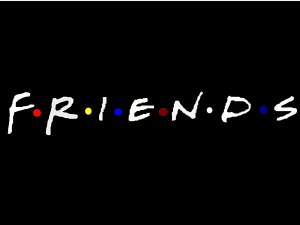By Maleigha Michael
*spoilers ahead*
 Friends was one of the many trendy sitcoms that came from the ’90s that is seen as a classic by many. And even though its last episode aired in 2004, it still seems to grow in popularity. Because of its familiar presence in the TV world today, its values and themes are important to pay attention to since they have such a strong impact on their audience. The main point I want to get across is that while Friends integrated some feminist perspectives, they were often countered to promote patriarchal ideals. And just because the sitcom had a few progressive tones, that doesn’t make it a feminist show; moreover, it definitely doesn’t mean we should accept them today, or should’ve accepted them back then. There are examples in every episode that I could discuss and pick apart, but since I don’t have 18 pages (front and back) I’ll only be addressing a few.
Friends was one of the many trendy sitcoms that came from the ’90s that is seen as a classic by many. And even though its last episode aired in 2004, it still seems to grow in popularity. Because of its familiar presence in the TV world today, its values and themes are important to pay attention to since they have such a strong impact on their audience. The main point I want to get across is that while Friends integrated some feminist perspectives, they were often countered to promote patriarchal ideals. And just because the sitcom had a few progressive tones, that doesn’t make it a feminist show; moreover, it definitely doesn’t mean we should accept them today, or should’ve accepted them back then. There are examples in every episode that I could discuss and pick apart, but since I don’t have 18 pages (front and back) I’ll only be addressing a few.
For those that say Friends is a feminist show, I want to point out that sure, it could be seen that way. But only if you’re idea of feminism is very outdated. The show introduced characters from the LGBTQIA community (or just LGBT, as it was recognized at the time), which should always be applauded, but the way those characters were received by the other characters is why the show is seen by others as outdated. For example, Chandler’s transgender father was constantly made fun of and Ross’s lesbian ex-wife was far too often oversexualized.
And of course I have to talk about the finale. In the beginning, Rachel started off as this idol for independent women: leaving a man at the altar, breaking away from her father’s money, and pursuing her dream career in fashion (and yes, I realize how unrealistic this part was since she had no prior experience in the industry, or proper schooling). One of the main plot lines to the show was the whole will-they-won’t-they back and forth love affair between Rachel and Ross, so it only makes sense that that’s how the franchise ended. But when the opportunity arises for Rachel to work for Louis Vuitton in Paris, episode after episode is focused on Ross trying to stop Rachel from leaving just so he could be with her. This all leads up to the end scenes of Ross convincing Rachel to stay. Ross wasn’t alone in this either. Phoebe and Joey actually encouraged him to go after Rachel, instead of encouraging him to support the woman he loves when she’s offered the chance of a lifetime. This ending was extremely disappointing for feminists for obvious reasons, but also because of the lasting impact it has on its viewers. After all of Rachel’s hard work and progress she’s made to get where she is, she turns down a major job opportunity to be with a man who wasn’t very supportive of her career choices in the first place.
For a character that had such a strong story line, the salute off the show that she was given is one of the many examples of how any feminist themes in Friends are overshadowed by regressive concepts that left a bitter taste in the mouths of feminists back then and especially today. The series may be one of the most popular sitcoms ever, but we shouldn’t accept any oppression of female dominance and simply pass it off as “that’s just how it was back then!” Finding feminism in any show is great, but Friends should NOT pass as a feminist show.